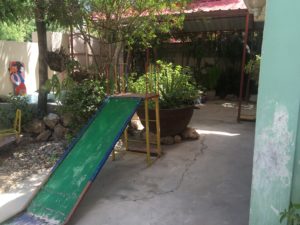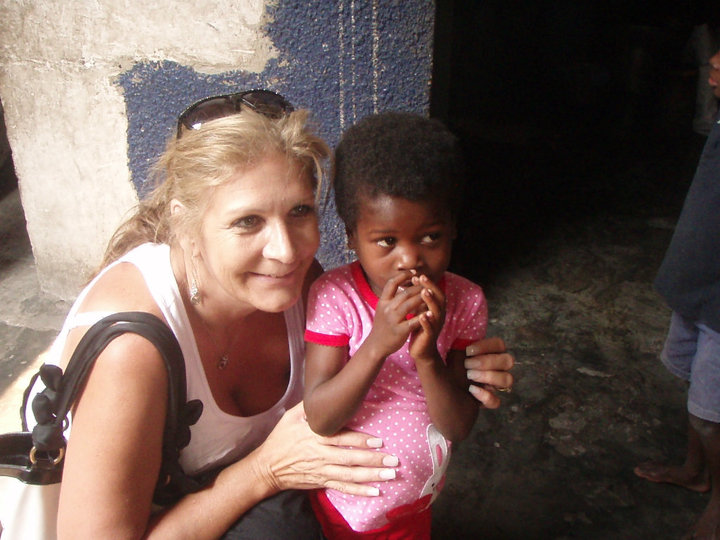I recently returned from a trip to Haiti. Many ask what we do as an agency when we travel internationally. Always on the agenda are trips to orphanages, or as in the case in Haiti, we visited three different crèches. Touring crèches allow us to not only visit and play with the children but also gives us an opportunity to view and evaluate the crèche and visit with the crèche directors. Since adoption from Haiti is complex and many different people are involved, trips to the country are very important.
 Also important are visits with that country’s adoption authority. Adoption from Haiti is governed by the Institut du Bien-Etre Social et de Recherches (IBESR). Meetings with IBESR provided me with the opportunity to discuss international adoption in Haiti with the Director of IBESR as well as others involved in the matching of children in need with prospective adoptive parents. My meetings with IBESR were invaluable and provided insight to the inner operations of this important institution, an institution that furthers the best interests of orphaned children in Haiti.
Also important are visits with that country’s adoption authority. Adoption from Haiti is governed by the Institut du Bien-Etre Social et de Recherches (IBESR). Meetings with IBESR provided me with the opportunity to discuss international adoption in Haiti with the Director of IBESR as well as others involved in the matching of children in need with prospective adoptive parents. My meetings with IBESR were invaluable and provided insight to the inner operations of this important institution, an institution that furthers the best interests of orphaned children in Haiti.
A visit to the U.S. embassy is always an appointment when our staff travels to Haiti, or any of our other country programs. For this particular trip, we were graciously invited to meet with Ronald Ward, Vice Consul and Acting Adoption Unit Chief. Meeting with the embassy and its officers provides us with the opportunity to ask questions about I800 Petition to Classify Convention Adoptee as an Immediate Relative visa processing. Additionally, discussions involved transition cases (I600 Petition to Classify Orphan as an Immediate Relative), IBESR, governing principles of The Hague Convention on Protection of Children and Co-operation in Respect of Intercountry Adoption (Hague Adoption Convention), what families should expect, and general questions that in effect, we hope will make our jobs easier, both as an agency as well as the U.S. embassy’s role with the final goal being a smooth fluid process for adoptive parents seeking to adopt children in Haiti.
 So what is the US embassy’s role in adoption? This differs slightly depending on whether the sending country is a signatory to the Hague Adoption Convention, however, the end result is issuing a visa for the child to travel to the U.S. with their new forever family. In this case, Haiti recently became a signatory to the Hague Adoption Convention in 2014, and is just now finalizing its transition to processing only Hague cases. The role of the embassy in the Hague process not only means issuing visas, but also in
So what is the US embassy’s role in adoption? This differs slightly depending on whether the sending country is a signatory to the Hague Adoption Convention, however, the end result is issuing a visa for the child to travel to the U.S. with their new forever family. In this case, Haiti recently became a signatory to the Hague Adoption Convention in 2014, and is just now finalizing its transition to processing only Hague cases. The role of the embassy in the Hague process not only means issuing visas, but also in
cludes issuing the Article 5 letter. The Article 5 letter notifies the sending country that the receiving country:
a) has determined that the prospective adoptive parents are eligible and suited to adopt,
b) has ensured that the prospective adoptive parents have been counselled as may be necessary, and
c) has determined that the child is or will be authorized to enter and reside permanently in that country.
Once this letter is issued to the adoption authority in Haiti, the adoption of that child may proceed. Later in the process, the US embassy conducts reviews of the legal adoption documents, conducts interviews of the adoptive parents and child, and if everything is in order, issues the child’s visa, permitting the child to enter the US.
After having visited with many US embassies across the globe over the years, the takeaway has always been that those working at the embassy do much more than is expected. As an example, in Haiti our US embassy has taken great strides and put in much effort to assist, train and educate the Haitian government officials. Much effort and patience has been invested by the embassy to educate and train the Haitian government, including those working at IBESR, as well as the judges who issue adoption decrees. This is no small feat when you take into consideration the travel involved to remote locations in Haiti. Any time a country deposits their Instrument of Ratification to The Hague it is an accomplishment, but the greater task is then implementing all the procedures needed to begin processing adoptions under the Convention’s guidelines. Here is where we have seen our US embassy, as well as the US State Department, step up and lend a helping hand.
It was a pleasure meeting with Officer Ward. He provided us with a wealth of information and I found him genuinely willing to answer our questions and offer assistance when needed. He assured us that he was available for future questions if issues arose. He also seemed genuinely committed to doing the best he can to assist adoptive parents once they arrive at his door step. This is what we want to see from all our embassies: individuals committed to helping not only adoptive parents, but children in need in Haiti.
We have a limited number of spots remaining in our Haiti program for 2016. If you’re interested in learning more about adoption from Haiti, please contact us.
